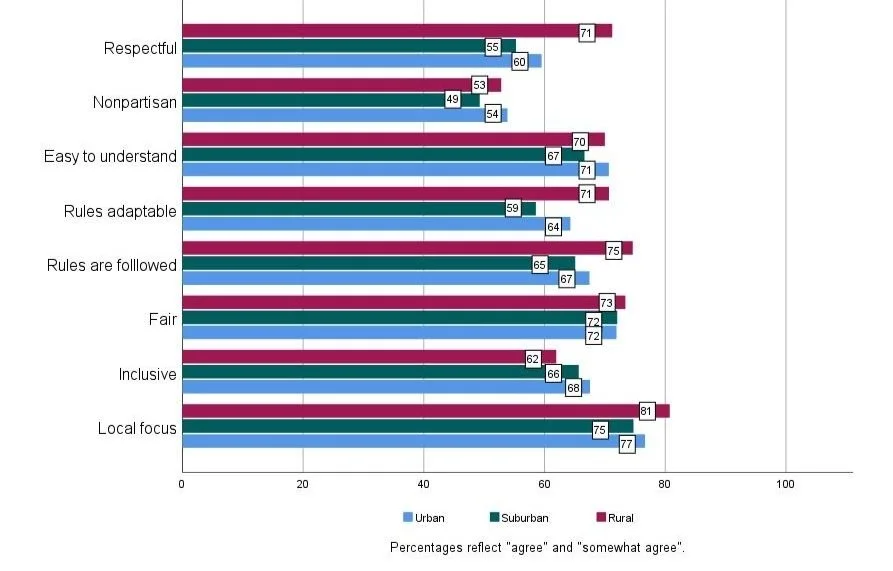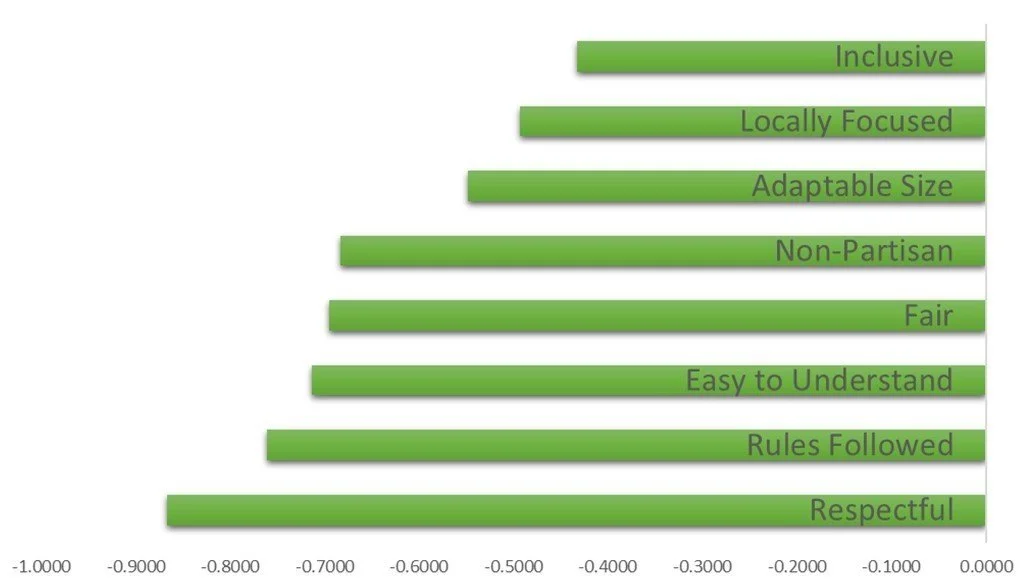Albertans' Views on Local Democracy
Jared Wesley | University of Alberta | jwesley@ualberta.ca
Lisa Young | University of Calgary | lisa.young@uclagary.ca
Victoria Matejka | University of Alberta | vmatejka@ualberta.ca
March 3, 2022
Introduction
As part of its commitment to enhancing democracy in the province, Alberta Municipalities (formerly the Alberta Urban Municipalities Association) launched a Local Democracy Pledge in 2021. The initiative encouraged candidates for local office to commit to a set of principles deemed important to the preservation of democracy in their communities. The Pledge came in response to concerns that local elections had become too heavily influenced by the dynamics of provincial and federal politics. To this end, the Pledge included promises to keep elections locally focused, have candidates remain independent and non-partisan, as well as conduct themselves with respectful behavior and transparency.
While some experts hold that such principles are vital to local democracy in Canada, how much do these values resonate with Albertans? And to what extent do they see these principles being upheld during municipal election campaigns?
This research brief investigates these questions using data from the Viewpoint Alberta survey conducted in October 2021, in partnership with Alberta Municipalities. Over 1200 respondents were asked about municipal elections being locally focused, inclusive, fair, non-partisan and respectful. In addition, they were asked about election rules including if they are easy to understand, being followed, and are adaptable. Each respondent was asked about the importance of the principles and then if these principles are actually seen in the most recent municipal election. The findings reveal considerable consensus among Albertans across the map and political spectrum.
"The elections Albertans want"
Figure 1 illustrates that the majority of people agree that all eight principles are either very important or somewhat important to local democracy. Fairness and adherence to rules are most valued, with 84% and 83% of respondents (respectively) finding them very important. For seven of the principles, the percentage of respondents answering very important and somewhat important ranges from 94% to 85%, non-partisanship being the exception. According to respondents, non-partisanship was the least important principle, however still a majority of people (79%) believe that it is either very important or somewhat important. A large majority of people share similar views on how elections should be carried out and governed.
Figure 1: Importance of Principles
To a certain extent, community type impacts how people perceive the importance and the presence of the principles. Compared with their urban and suburban counterparts, rural respondents were more likely to place a higher degree of importance on all of the principles, except non-partisanship. With a range of 93% to 98%, the large majority of rural respondents thought the principles were either very important or somewhat important. However, non-partisanship was an outlier again. Only 77% of rural respondents believed it was important, noticeably below both the urban and suburban respondents.
However, urban and suburban beliefs did not stray that far from the rural respondents. Once again for all of the principles except non-partisanship the percentages of importance were still very high (93% - 87%). Non-partisanship was lower for each urban (81%) and suburban (78%).
Figure 2: Importance of Principles by Community Size
Personal ideology also affects the way Albertans view politics and elections. Respondents were asked to place themselves on a spectrum from 1 to 10. These numbers were then categorized as far left (0 to 1), centre-left (2 to 4), center (5), centre-right (6 to 8), and far right (9 to 10).
Figure 3 shows that the center-left respondents considered inclusivity, adaptability of rules, respectful discourse, ease of understanding, rules followed, and local focus with the highest importance. Far left respondents believed that fairness and non-partisanship were most important. Again, the majority of the values are very high and do not exhibit much variation across the political spectrum. The percentage of respondents that believe the principles are very or somewhat important only ranges from 99% to 74% (including non-partisanship this time). Non-partisanship was the lowest-ranked principle once again with 74% of far-right respondents believing it is important and 85% of far-left respondents believing it is important.
Figure 3: Importance of Principles by Ideology
"The elections Albertans had"
Respondents were also asked if they believe that these principles are actually present within the municipal elections that were taking place while the survey was being administered in October 2021. The same eight principles were included, however, respondents were asked whether they agreed that the principles were on display during the ongoing campaign.
Recall that fairness and adherence to rules were the most important principles according to respondents. Depicted in Figure 4, however, only 73% of people believed the elections were fair and only 68% of people believed rules were followed during the campaign itself.. This gap exists with regard to each of the principles. The range of percent of people that believe these principles are present ranges from 77% to 60%, again not including non-partisanship as it is an outlier. This is in contrast to the 94% to 85% or respondents believing these principles are important from Figure 1.
Only a slight majority of people (52%) believed that the most recent municipal elections were non-partisan. We can see that while people may expect these principles to be followed, there is doubt within the public that these principles are actually present.
There is clearly a discrepancy between what people believe should be happening and the faith they have that these principles are actually being applied.
Figure 4: Presence of Principles
Compared to their urban and suburban neighbours, rural respondents were more likely to agree that the principles were being observed in five of the eight cases. Rural respondents agreed that the principles of respect (71%), adaptable rules (71%), rules followed (75%), fairness (73%), and locally focused (81%) were present. Urban respondents agreed in the highest numbers that the principles of easy to understand (71%) and that elections were inclusive (68%). Once again non-partisanship was the least-observed as the principle. Just over half of rural (54%) and urban (53%) respondents believed the most recent municipal elections were non-partisan. Only 49% of suburban respondents believed the elections were non-partisan.
Figure 5: Presence of Principles by Community Size
Figure 6 shows the perceived presence of the principles by respondents’ ideology. Recall that Albertans on the far left tend to place a high level of importance on most of the values examined. However, when it comes to whether those principles were being upheld, the far left is the most skeptical. While the far left believes in democracy and the principles that should be applied to govern elections, many believe that these principles are not actually being demonstrated during election campaigns. Figure 6 shows much more variation between groups than any of the other previous figures. For respectfulness, only 44% of far-left respondents believed that candidates and voters were respectful to each other during municipal elections, whereas 77% of far-right respondents believe this to be true. These large gaps exist for all of the principles except local focus.
Figure 6: Presence of Principles by Ideological Placement
Gaps between Ideals and Reality
To better understand where respondents perceived a gap between the principles that should be present and the principles that they observed in the 2021 municipal elections, we created a measure that took each respondent’s score on how important a principle was, and subtracted it from their score on how present it was. For example, if a respondent thought that fairness was “very important” (5 out of 5) and “agreed” that it was present (4 out of 5) then the score for fairness would be -1.
Figure 7 shows that, on average, these difference scores were negative: the municipal elections did not quite meet respondents’ ideal standards. But the differences were not large, on average. The average (mean) difference for “inclusive” was 0.5, while the average difference for “respectful” was 0.9.
Figure 7: Differences: Presence - Importance
Concluding Thoughts
In developing their Pledge, Alberta Municipalities identified eight bedrock principles of local democracy. Albertans overwhelmingly agree on the importance of these values in theory, but question the presence of them in practice. Compared to other elements of public opinion studied by our Viewpoint Alberta team over the past three years, there was a much higher level of consensus when it came to foundational democratic principles. Support spanned the spectrum, traversed the map, and cut across all socio-economic groups. This is encouraging news in an era of pitched partisanship, suggesting that Albertans do share common ground in terms of their expectations of democratic norms.
Methodology
The September 2021 Viewpoint Alberta Survey was conducted between September 21 and October 6, 2021. The survey was deployed online by Leger. A copy of the survey questions can be found here: https://bit.ly/2YEMObS. Leger co-ordinates the survey with an online panel system that targets registered panelists that meet the demographic criteria for the survey. Survey data are based on 1204 responses with a 17-minute average completion time. This wave of the Viewpoint Alberta Survey was led by co-principal investigators Jared Wesley, Michelle Maroto, Feodor Snagovsky, and Lisa Young. It was funded in part by a Research Cluster Grant from the Kule Institute for Advanced Study (KIAS) at the University of Alberta. The portion of the survey dealing specifically with campaign finance and local elections was funded, in part, by Alberta Municipalities/







